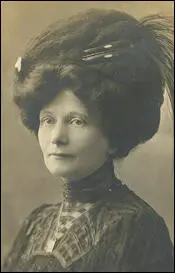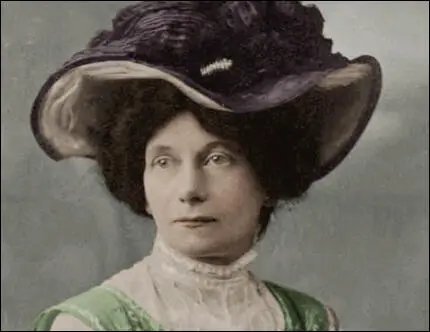Mary Jane Clarke

Mary Jane Clarke, the daughter of Robert Goulden and Sophia Crane, was born in Manchester in 1862. She was the younger sister of Emmeline Pankhurst. Her father was successful businessman with radical political beliefs. Goulden took part in the campaigns against slavery and the Corn Laws. Mary's mother was a passionate feminist and started taking her daughter to women's suffrage meetings in the 1870s.
The Pankhursts were members of the Manchester branch of the NUWSS. By 1903 Emmeline Pankhurst had become frustrated at the NUWSS lack of success. With the help of her two daughters, Christabel Pankhurst and Sylvia Pankhurst, and her sister Mary Clarke, she formed the Women's Social and Political Union (WSPU). At first the main aim of the organisation was to recruit more working class women into the struggle for the vote.
Mary Clarke organised a WSPU branch in Brighton. Acoording to Sylvia Pankhurst: "On ceasing to be Mrs. Pankhurst's deputy in the Registrarship, she had become an organiser for the W.S.P.U., and thereby found release from the regretful memories of an unhappy marriage."
By 1905 the media had lost interest in the struggle for women's rights. Newspapers rarely reported meetings and usually refused to publish articles and letters written by supporters of women's suffrage. In 1905 the WSPU decided to use different methods to obtain the publicity they thought would be needed in order to obtain the vote.
On 13th October 1905, Christabel Pankhurst and Annie Kenney attended a meeting in London to hear Sir Edward Grey, a minister in the British government. When Grey was talking, the two women constantly shouted out, "Will the Liberal Government give votes to women?" When the women refused to stop shouting the police were called to evict them from the meeting. Pankhurst and Kenney refused to leave and during the struggle a policeman claimed the two women kicked and spat at him. Pankhurst and Kenney were arrested and charged with assault.
Christabel Pankhurst and Annie Kenney were found guilty of assault and fined five shillings each. When the women refused to pay the fine they were sent to prison. The case shocked the nation. For the first time in Britain women had used violence in an attempt to win the vote. Members of the WSPU now became known as suffragettes.
On 25th June 1909 Marion Wallace-Dunlop was charged "with wilfully damaging the stone work of St. Stephen's Hall, House of Commons, by stamping it with an indelible rubber stamp, doing damage to the value of 10s." According to a report in The Times Wallace-Dunlop printed a notice that read: "Women's Deputation. June 29. Bill of Rights. It is the right of the subjects to petition the King, and all commitments and prosecutions for such petitionings are illegal."

Wallace-Dunlop was found guilty of wilful damage and when she refused to pay a fine she was sent to prison for a month. Christabel Pankhurst later reported: "Miss Wallace Dunlop, taking counsel with no one and acting entirely on her own initiative, sent to the Home Secretary, Mr. Gladstone, as soon as she entered Holloway Prison, an application to be placed in the first division as befitted one charged with a political offence. She announced that she would eat no food until this right was conceded."
Marion Wallace-Dunlop refused to eat for several days. Afraid that she might die and become a martyr, it was decided to release her after fasting for 91 hours. Soon afterwards other imprisoned suffragettes adopted the same strategy. Unwilling to release all the imprisoned suffragettes, the prison authorities force-fed these women on hunger strike.
Mary Clarke began to organize the breaking the windows of buildings in Brighton. According to Sylvia Pankhurst: "Facing the rude violence of the seaside rowdies at Brighton, where she was stationed, she displayed a quiet, persistent courage, which made peculiarly large demands on one so sensitive. Exerting her frail physique to its utmost, she was grievously ill on the eve of Black Friday, and her Brighton comrades had begged her not to go. She had promised to take the easier course of arrest for window-breaking, and had telegraphed to Brighton from the police court."
Mary Jane Clarke was arrested and sent to Holloway Prison, where she endured a hunger-strike and forced-feeding. She was released on 22nd December, 1910 but two days later Emmeline Pankhurst found her unconscious and she died soon afterwards as a result of a burst blood vessel on the brain. Clarke, like several suffragettes, probably died as a result of being forced fed in prison.
Primary Sources
(1) Sylvia Pankhurst, The Suffrage Movement (1931)
Amongst the seventy-five Suffragettes now in Holloway was Mrs. Pankhurst's sister, Mary Clarke. On ceasing to be Mrs. Pankhurst's deputy in the Registrarship, she had become an organiser for the W.S.P.U., and thereby found release from the regretful memories of an unhappy marriage. Facing the rude violence of the seaside rowdies at Brighton, where she was stationed, she displayed a quiet, persistent courage, which made peculiarly large demands on one so sensitive. Exerting her frail physique to its utmost, she was grievously ill on the eve of Black Friday, and her Brighton comrades had begged her not to go. She had promised to take the easier course of arrest for window-breaking, and had telegraphed to Brighton from the police court: "One month: I am content to pay the price of victory."
Preparing to leave for America, and revising the final chapters of The Suffragette, I spent Christmas alone at Linden Gardens. Early on the morning of Boxing Day I saw at the window my mother's face, haggard and drawn. I ran to admit her: "Something has happened!" "Aunt Mary is not very well," she faltered. "She is dead, I know."
Yes; she was dead, our gentle confidante, too frail to weather this rude tide of militant struggle. Released from prison two days before, she had spoken at the welcome luncheon in London, hastened to Brighton to address a welcome meeting there the same night, and returned on Christmas Eve to her brother's house in London. She was with Mrs. Pankhurst and others of the family at the mid-day Christmas dinner, and quietly left the table. When Mrs. Pankhurst went to look for her she found her unconscious. She had burst a blood vessel on the brain.
(2) Fran Abrams, Freedom's Cause: Lives of the Suffragettes (2003)
On Christmas Day 1910 Emmeline's sister Mary Clarke, to whom she had always been close, died from a brain haemorrhage shortly after being released from prison. The extraordinary self-restraint, the sheer focus with which Emmeline appears to have handled these losses suggests she was a more buttoned-up, less openly emotional person than she actually was. Although her younger children might all, at times, justifiably have accused her of neglect they Could never have accused her of being a strait-laced Victorian matriarch.

